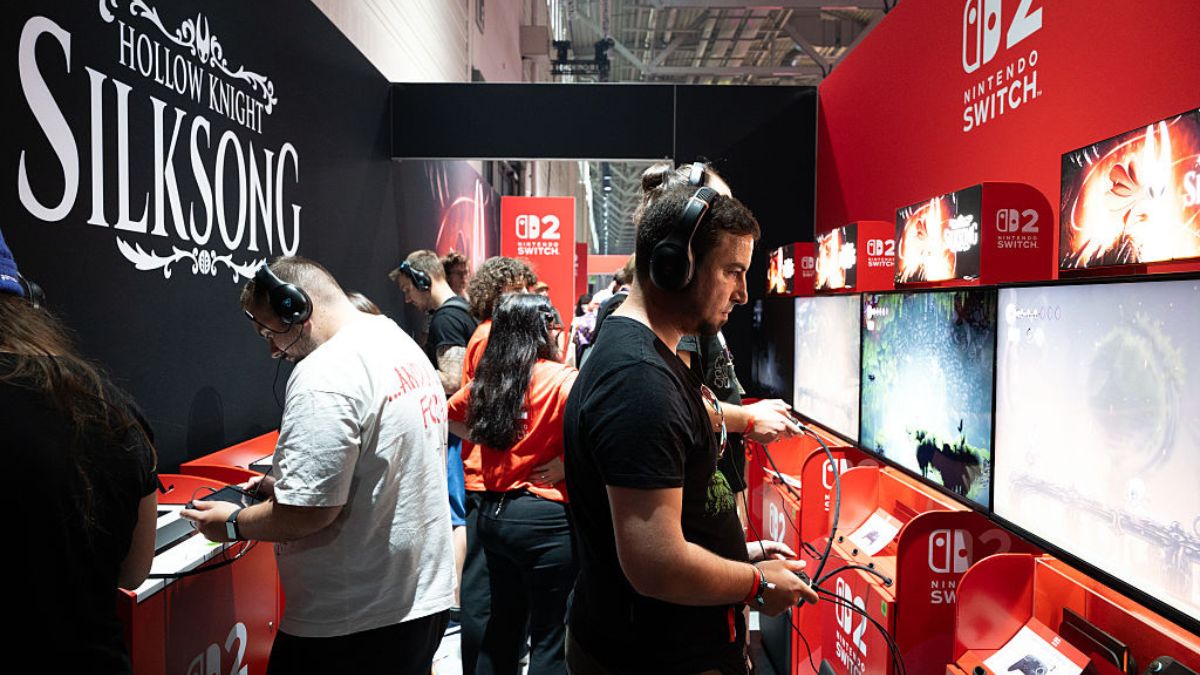Imagine this scenario: you’re trying to skip class, so you slowly creep underneath the desks and make your way to an exit. Except, you ran between them at the same time your teacher stopped scribbling nonsense on the board and turned around. When she notices you, her neck extends several feet to where you’re standing and she devours your body whole. Sounds like something straight out of a nightmare. Little Nightmares II is aptly named, taking you through nightmarish scenarios like the one described, as well as some heart-racing encounters with other monstrous beings.
Little Nightmares II expertly combines gorgeous art direction and ominous atmosphere to provide an overall uneasy feeling while playing. At its core, it’s a puzzle platformer with a few repetitive puzzles and occasionally wonky platforming, but it does offer up clever level design and some genuinely great gameplay moments. The storytelling comes from its incredible, creepy environments and vignettes rather than any dialogue. I for one appreciate this “show, don’t tell” approach in games, especially when the atmosphere speaks for itself.
Little Nightmares II takes a lot of inspiration from games like Limbo and Inside in its environment and level design. The game begins with the protagonist waking up in the woods — not unlike the games it’s inspired by — and the first level utilizes the same style of tutorialization by environment design that’s associated with Playdead’s puzzle platformers. As a sequel, Little Nightmares II also straddles that fine line between staying true to its predecessor while standing out as a unique experience. It does eventually find its voice, but it takes a while to get there.

As a puzzle-platformer, the platforming can sometimes feel a little clunky from its controls and confusing perspectives. Puzzles tend to be a bit repetitive too. I lost count of how many times I had to drag and move an object so I could climb to greater heights. Not every puzzle needs to feel fresh and unique, and Little Nightmares II showcases some memorable gameplay sequences, its puzzles often feel repetitive and overused.
That being said, my biggest concern is its reliance on trial and error. In some games, this sort of experimentation can be utilized well to allow the player to learn the mechanics of a difficult section or a particularly troublesome boss fight, and overcoming that feat feels rewarding. But in Little Nightmares II, the number of times I had to redo a section because of something unexpected left me annoyed and ruined my immersion. I was awestruck at how each tiny detail in the game’s levels adds to its impeccable atmosphere. But more often than not, going back to the beginning of a sequence to try it all again as a result of an unforeseeable trap didn’t feel rewarding. It made me frustrated, and I was no longer impressed by the scenes that played out around me.
If it weren’t for those frustrating sections, I would be completely swept up in the world of Little Nightmares II. I often found myself frightened at the thought of what might happen next, or who might be chasing me. The monsters feel ripped right out of my worst dreams, especially the aforementioned Teacher. The game uses horror in the best way, leaving you with more questions than answers, and letting your imagination fill in the blanks. Little Nightmares II really comes into its own by the hospital level, both in its horror and level design, as well as its puzzles and chase sequences. At that point, I was completely immersed and absolutely terrified of whatever was going on in that hospital — needless to say, some of the game’s best moments unfold here.

It takes a while to find a voice of its own, but when it finally comes together, Little Nightmares II is a worthwhile horror experience, bolstered by its immersive environments, eerie art design, and captivating vignettes. Admittedly, some of its puzzles are repetitive, and its platforming is best described as clunky, but when it’s firing on all cylinders, it really stands out. Some of its designs are so delightfully scary, it could definitely give me a few nightmares of my own.
This review is based on the PlayStation 4 version of the game. A copy was provided by Bandai Namco.










Published: Feb 9, 2021 10:00 am